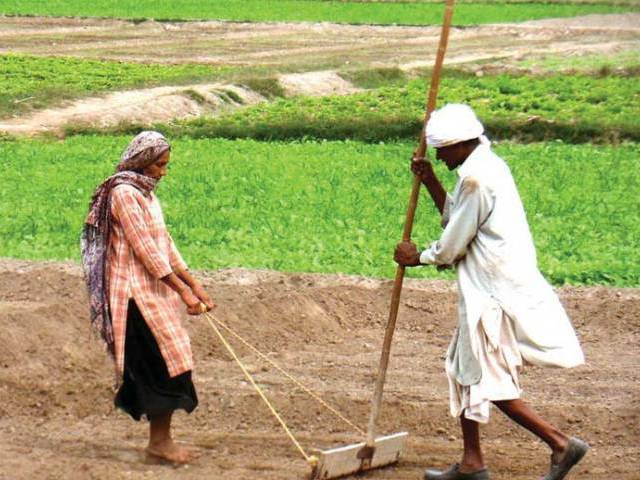Rs100b Khadim-e-Punjab Kissan package announced
The package is unable to address the core issues, argues expert.

The package is unable to address the core issues, argues expert. PHOTO: APP
“This is good news for the farming community. However, all these subsidies would hardly save Rs2,000-2,500 per acre for us,” said Pakistan Kissan Ittehad President Khalid Khokhar while talking with the The Express Tribune. Government needs to fix a support price for the commodities as that might help the farmers and the government better utilise the proposed package, he added.

Punjab, which contributes around 54% to the country’s GDP, has largely been affected due to low global commodity prices. Farmers in Punjab are unhappy with the government largely due to high input cost, taxes and non-availability of level playing field with India.
A total of Rs49.27 billion has been allocated for the production sector. This comprises of Rs20 billion for agriculture, Rs9.23 billion for livestock and dairy development, Rs2.2 billion for forestry, Rs755 million for fisheries and Rs865 million for food, among other allocations.
The agriculture sector, a mainstay of provincial economy is providing employment to 43.5% of the population, 61% of which is from rural areas. Yet this sector is struggling due to old farm practices, unavailability of water, high input and electricity costs.
Provincial government’s initiative to spend Rs100 billion in the next two years is seen as an artificial support for the rural economy that would otherwise collapse under its own weight.
Under the allocations of Rs50 billion for next fiscal year 2016-17, Rs11.6 will be spent on subsidising fertilisers, Rs17.7 billion will be used for interest free credit and smart phones for farmers. Rs7 billion will be utilised for subsidy on electric tube wells, Rs3 billion on cotton seed reforms project, Rs2.5 billion on Punjab Warehouse receipt financing system, Rs2.1 billion on high value agriculture, Rs1.8 billion on high tech mechanisation service centres, Rs1 billion on farmers cooperatives and Rs3.3 billion for other initiatives.
Others see these support initiatives missing out on the bigger picture. “This package is unable to address the core issues of the sector, which would make things worse for the food security of the country,” said Doctor Qais Aslam, an economist, in an interview with The Express Tribune.

“Did government make any mechanism to address the shortage of water or to address the issue of floods?” he asked. “Farmers are in panic, the loss in cotton fields has forced many farmers to harvest other crops, in cotton fields new sugar mills are being established which would change the dynamics of the cotton crop,” he added.
Energy
Government has allocated only Rs9 billion for the next fiscal to complete on-going power projects, claiming that their initiative has attracted fresh investments in energy sector in the province.
Currently Punjab government is working on establishing 1,320MW coal power project with Chinese investors in Sahiwal. 1,180MW R-LNG based power plant at Bhikki, 900MW solar power project in Bahawalpur, 1,223MW project at Balloki, 1,230MW R-LNG power project at Haveli Bahadur Shah Jhang and 135MW Taunsa hydropower plant are being developed by Independent Power Producers (IPP).
Aslam, however, said that Punjab government needs to introduce some policies for energy conservation as these initiatives alone would not do.
“The initiatives Punjab is taking to control the energy crisis might help reduce load-shedding for domestic consumers, but it would not help eliminate the power shortages for industrial consumers,” he added.
Published in The Express Tribune, June 14th, 2016.
Like Business on Facebook, follow @TribuneBiz on Twitter to stay informed and join in the conversation.


















COMMENTS
Comments are moderated and generally will be posted if they are on-topic and not abusive.
For more information, please see our Comments FAQ